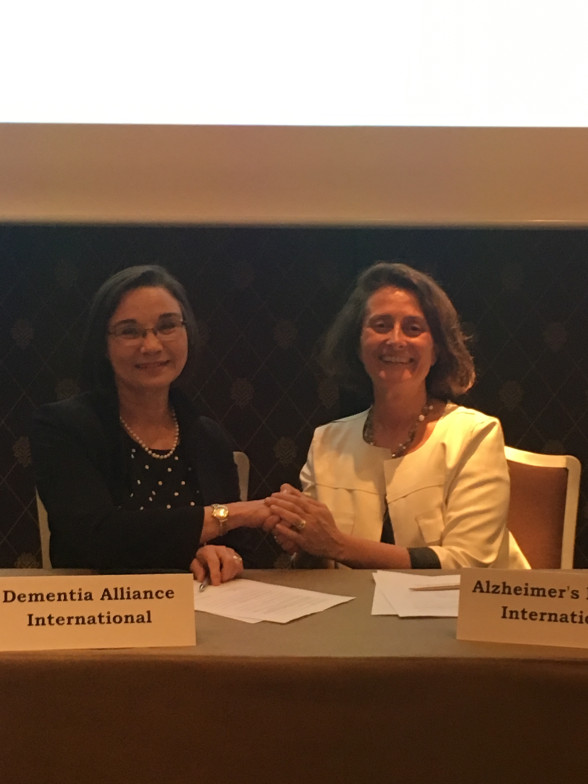 Following a DAI, ADI, GADAA and Swiss Government Side event last night at the 70th World Health Assembly in Geneva, I was also able to sign the Memorandum of Understanding (MoU) between DAI and ADI, and this photo is of the new CEO, Paola Barbarino and me signing it. This means the two organisations will continue to work in collaboration, but autonomously, as sister organisations for the benefits of people with dementia and our families, and ensures we have sponsorship to support people with dementia through DAI.
Following a DAI, ADI, GADAA and Swiss Government Side event last night at the 70th World Health Assembly in Geneva, I was also able to sign the Memorandum of Understanding (MoU) between DAI and ADI, and this photo is of the new CEO, Paola Barbarino and me signing it. This means the two organisations will continue to work in collaboration, but autonomously, as sister organisations for the benefits of people with dementia and our families, and ensures we have sponsorship to support people with dementia through DAI.
These are my speech notes for the Side Event mentioned above:
"NEW OPPORTUNITIES FROM THE GLOBAL ACTION PLAN ON DEMENTIA"
Distinguished guests, ladies and gentleman
People with dementia greatly value the global leadership of Dr Saxena, Dr Dua and Dr Margaret Chang and their team, in meeting the needs of people with dementia providing this World Health Organisation "Global Action Plan for a Public Health Approach to Dementia" which we hope will be accepted at the WHA tomorrow or soon after.
I was asked to discuss why a global action plan has been so important to me, and was also given the brief to be challenging. Of course, that is not difficult for me.
In reality, we need this plan because care is failing, and research for a cure is failing.
In representing the global community of people living with dementia, although my own experience is unique, I have been campaigning for human rights based approach to dementia for many years. What this means is a whole of health care approach, and support for disabilities to maintain independence for as long as possible, with educated health care workers who provide optimal care that includes rehabilitation, and dignity for all people.
We wish to state today that we are concerned the Global Action Plan provides little evidence of using the UN Convention on the Rights of Persons with Disabilities to underpin the policy, and therefore ask that we all work together to ensure human rights for all, including people with dementia.
People with dementia are fully recognised by the UN as rights bearers under this treaty, which means that the governments of the 173 Member States who have ratified the Convention have been held to account for their inclusion by the UN Human Rights Bodies since the Treaty came into full operation in 2008.
We ask for the support of all Health Ministers and their governments to enable the 50 million people now living with dementia and the 100 million who must not be Left Behind in 2030 to have access to their rights in international law on the same basis as those with other disabilities.
We will continue to advocate for governments and all members of civil society to work towards ensuring the human rights based approach to dementia will be reflected in their national dementia strategies as we work together to implement this plan in society to ensure a higher quality of life for people living with dementia and our families.
Thank you.
Kate Swaffer
Chair, CEO & Co-founder, Dementia Alliance International
Please note, I only had three minutes as part of a panel, so was unable to give a more complete response from DAI to the Plan.
